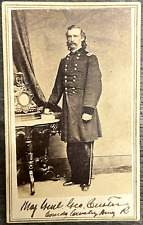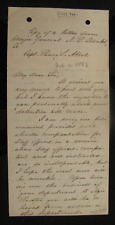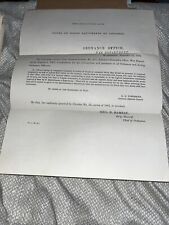When you click on links to various merchants on this site and make a purchase, this can result in this site earning a commission. Affiliate programs and affiliations include, but are not limited to, the eBay Partner Network.
Rare and original, 1863 manuscript Civil War Letter written by Brigadier General Edward A. Wild while commanding \"Wild\'s African Brigade\" - combined force of the 55th Massachusetts Infantry (colored troops) and two Regiments of freed African American Slaves from North Carolina that was among the earliest African American Regiment that fought during the Civil War. This Letter was written by Brigadier General Edward A. Wild to his mother just a few days after his African American troops took part in the capture of Fort Wagner and Fort Gregg at Morris Island, South Carolina.
Edward A. Wild, a fervent abolitionist, was wounded twice (the second time losing his left arm) and would be commissioned Brigadier General on April 24, 1863. He was instrumental in recruiting African American Soldiers for the 54th Massachusetts Infantry as well as recruiting white officers to lead them. Wild returned to field command after losing his arm and commanded a Brigade of Black Troops that became known as \"Wild\'s African Brigade\" which included the 55th Massachusetts Infantry, and the 2nd and 3rd North Carolina Colored Volunteers (which later became renumbered as the 36th and 37th U.S. Colored Troops respectively). See below for more information on the fascinating life and military career of this larger than life Civil War General.
This fascinating, Civil War letter was written from Folly Island, North Carolina and is dated September, 17th (1863). It was written by then Brigadier General Wild to his mother. It is written in the blank areas, on both sides of a printed \"General Orders\" document that was issued at Morris Island on September 2nd, 1863 (just 4 days before Confederate forces abandoned Fort Wagner and union troops including members of Wild\'s African Brigade took possession of both Forts Wagner and Gregg). The sheet measures approx. 5\" by 8\" and has printed text in a small area at the center of one side (the other side is blank). The Letter is signed simply \"E.A.W.\" and both the content and other exemplars of Wild\'s handwriting both in our possession and elsewhere confirm that it was written by Edward A. Wild.
General Wild begins by relating events of the night before when his Brigade faced an attack by Confederate troops during a driving rain storm. He tells of having to ride with his Brother Captain Walter Wild (General Wild\'s Aide-de-Camp) for six miles in the torrential storm and twice falling into a \"pitfall\" - a 10 foot deep entrenched fortification that was covered over with \"boughs and palm leaves\" - once while on horseback. Wild writes \"In consideration of all this the rebels postponed their visit. Perhaps the storm was too violent even for them. So we have got to keep awake tonight again + keep expecting them. However the storm is still raging\". Wild speaks of the fall of Forts Wagner and Gregg just a few days before and writes of his African American soldiers \"Some of my men were of the foremost to rush into them. They being out all night in the trenches, armed themselves with pikes from the ditch of Wagner, and rushed upon Gregg, ahead of everything\".
The full text of the letter reads as follows:
\"Folly Island S. C. Sept 17 (1863)
My dear Mother, We have received several letters from you at different times and all welcome, even when they contain unpleasant news. I am very well indeed now - have had some disturbance from hot sun, about the head - all right now. Walter wrote the above and left it open for me to add a word. But I have had no time till now. Yesterday was the anniversary of my amputated arm. It passed over with only some extra neuralgia, not enough to make a magical coincidence, but enough to indicate a coming storm; which did come accordingly and has been raging a day + a half - a real equinoctral to all appearance - rain driving heavily + sand blowing about - very rough on the men. The enemy took advantage and planned a night attack nd surprise on our end of the Island. But as we received some intimation thereof, we were all on the alert and quite ready for them. But we had to stand out expectantly in the violent storm for a long time in the blackness of night: so black that it as dangerous riding about. Walter and I had to ride six miles through the midst of it all. We got somewhat bewildered, got half floundered in a quagmire, - and finally I rode my horse into a pitfall - it being a camp-well, made by digging a narrow trench, including down to a depth of 10 feet then sinking a well at the bottom, and shading over the top with boughs + palm leaves. I felt him sinking, and sprung off so quickly as to let him go down without me. Walter stopped just in time to save himself - it was hopeless to try to get the beast out in the dark, so I started for the nearest camp for help, lanterns, etc. and after feeling my way for about 3 rods, I pitched headlong into another well, 10 feet deep - similar to the other. Being only a little barked I scrambled out and soon heard Walter shouting. The horse had turned some somersets, and getting on his feet and found his way out of the trench, the Lord knows how. And the first thing Walter knew, he found him by the side of his horse. We managed to get home alive, but slowly. such was my anniversary - In consideration of all this the rebels postponed their visit. Perhaps the storm was too violent even for them. So we have got to keep awake tonight again + keep expecting them. However the storm is still raging. I trust all things go smoothly in your family - Love to all - send us news from Charles. Wagner + Gregg have fallen. Some of my men were of the foremost to rush into them. They being out all night in the trenches, armed themselves with pikes from the ditch of Wagner, and rushed upon Gregg, ahead of everything.
E.A.W.\".
This very rare and original Civil War Brigadier General\'s Letter is in good to very good condition. The Sheet has areas of water staining which was surely the result of having been written and sent during a torrential storm. There is a central, horizontal crease with a short separation at one end and 2 tiny holes in the sheet that appear to be insect damage. The letter was written on a \"make-do\" sheet - a printed order with a blank back - using all available space for the writing as can be seen in the scans below. The Letter came to us with a small collection of Civil War letters written by members of the Wild Family and is unconditionally guaranteed original and in the hand of Brigadier General Edward A. Wild.
A VERY rare and fascinating, original, 1863 Manuscript Civil War Letter written by Brigadier General Edward A. Wild - commanding officer of one of the first Brigades of African American Troops to fight in the Civil War and a fantastic addition to any collection!!!
More about the life and Civil War service of Brigadier General Edward A. Wild:
Edward Augustus Wild (November 25, 1825 – August 28, 1891) was an American homeopathic doctor and a brigadier general in the Union Army during the American Civil War. Wild practiced alongside his father as a homeopathic physician in Brookline, Massachusetts until 1855, when he and his new wife traveled to Turkey. He joined the Ottoman Army as a medical officer and served in the Crimean War. He then returned to Massachusetts and resumed his medical practice.
With the outbreak of the Civil War, Wild enlisted in the Union Army as a front-line officer, preferring to command troops rather than to treat their injuries. He served as a captain in Company A of the 1st Regiment Massachusetts Volunteer Infantry. from May 1861 until July 1862. He fought in First Battle of Bull Run and again in the Peninsula Campaign, where he was wounded at the Battle of Seven Pines. On August 21, he was appointed Colonel of the 35th Massachusetts Infantry and assigned to the Army of the Potomac\'s IX Corps. Wild led his new regiment into combat during the Maryland Campaign. At the Battle of South Mountain, Wild suffered another severe wound, one that necessitated the amputation of his left arm. He returned home to recuperate.
By April 1863, Wild had recovered enough to resume his military duties, and was promoted to brigadier general on April 24 and assigned to recruiting duties. A fervent abolitionist, he aggressively recruited black soldiers for the United States Colored Troops, as well as helping recruit white officers to lead them, including helping Robert Gould Shaw fill his officer complement for the 54th Massachusetts Infantry. Wild was friends with fellow abolitionist and author Harriet Beecher Stowe and enlisted her half-brother, James C. Beecher, as a white officer in one of the new black regiments. When Wild was able to resume his field duties, he freed hundreds of slaves in North Carolina, resettled them safely on Roanoke Island in North Carolina, and then recruited many of them to join the military.
Wild took command of a brigade of black infantry that soon became known as \"Wild\'s African Brigade.\" The brigade, headquartered in Norfolk, comprised the 55th Massachusetts Infantry, and the 2nd and 3rd North Carolina Colored Volunteers (which later became renumbered as the 36th and 37th U.S. Colored Troops respectively). Wild\'s men served in the Charleston, South Carolina, area and saw action in numerous skirmishes and battles in that region, including an expedition to South Mills and Camden Court House in December. Transferred to the Army of the Potomac in 1864, Wild and his black soldiers participated in the Overland Campaign and the subsequent Siege of Petersburg, Wild\'s men constructed and manned Fort Pocahontas, an earthen-walled Virginia fort on the James River that during the Battle of Wilson\'s Wharf withstood an attack on May 24 by Fitzhugh Lee\'s Confederates.
In early 1865, Wild\'s men performed picket duty along the Appomattox River. They were a part of the large force of black troops under Godfrey Weitzel that occupied the former Confederate national capital, Richmond, Virginia, holding that city through the end of the war. Wild\'s men were among those troops who witnessed the historic visit of President Abraham Lincoln to Richmond following the city\'s fall to the Union forces. In July, Wild ordered and supervised the torture of several members of the Chennault family in Danburg, Ga. Suspecting them of being involved in the missing Confederate gold, he had their hands tied behind their backs and their thumbs strung up. In the case of one of the prisoners, this caused the flesh to be stripped from the bones. Members of his unit forced the Chennault ladies to disrobe in search of \"stolen\" jewelry. Wild was honorably discharged in January 1866, receiving no punishment for his actions (which may or may not have measured up to war crimes).
After the war, Wild could no longer practice medicine due to his war injuries. He engaged in silver mining in Nevada as a superintendent of operations. He operated in the Diana Mine, now part of the Berlin-Ichthyosaur State Park near Austin. He traveled extensively in South America. He died in Medellín, Colombia, and was buried in the city\'s Cementerio de San Pedro.
Overseasshippping is extra and cost will be quoted at buyers request. Massachusetts residents must add 6.25% sales tax.
Please check out other early and interesting items offered by this seller on . Click Here to See Our Items We Have for Sale in the Gallery and Click Here to Add Us To Your Favorite Sellers List.
Click Here to Discover More About this Item and Many Others on Our New Informational / Non-Commercial / Reference Blog - Walnutts.com.
Important Notes about Shipping Charges:
The amount quoted for Shipping & Handling is calculated by and is equal to the EXACT amount charged by the Post Office plus a $1.00 \"packing fee\" - the $1.00 fee is our only compensation for the virgin packing materials we use on all of our professionally packaged boxes as well as our cost for the salaried help that does most of our packing - as I am sure you can see, we make NO profit on the Shipping charges and, in fact, our costs are usually greater than the $1.00 fee. Please contact us if there are any issues regarding the cost of shipping.
.







